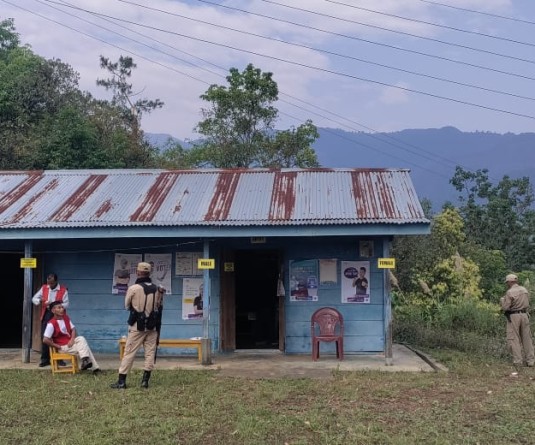
New Delhi, November 11 (The Hindu): The Army’s top commander in Jammu and Kashmir has said the country could be compelled to grant the State independence by 2016 if government plans to lift the controversial Armed Forces Special Powers Act from some areas go ahead, highly-placed security sources have told The Hindu. The assertion was made on Wednesday in an over hour-long presentation to the Unified Headquarters, the State’s top coordination body for security, by Lieutenant-General Syed Ata Hasnain, who commands the Srinagar-based XV Corps.
Army officials would not confirm the contents of the presentation, but three officials present at the meeting separately provided The Hindu with the same account of what was said. The presentation also included a slide, which asserted that while the State people were seeking bijli, sadak, paani (electricity, roads, water), calls for lifting the AFSPA were coming from four categories: Pakistan, the Inter-Services Intelligence Directorate, terrorists and secessionists.
Chief Minister Omar Abdullah, who chairs the Unified Headquarters, interjected to ask Lt. Gen. Hasnain to leave a copy of the slide behind, so he could “see where I fit in.” The presentation made no mention of the fact that the demand for lifting the AFSPA has been supported by Union Home Minister P. Chidambaram and forms part of the recommendations of the recently submitted report of three interlocutors
Lt.-Gen. Hasnain claimed that lifting the AFSPA would provoke large-scale disturbances which, in the context of the looming withdrawal of western forces from Afghanistan and the enhanced presence of members of the Organisation of the Islamic Conference on the United Nations Security Council, would lead to Jammu and Kashmir’s independence. The Army’s assessment was, however, disputed by representatives of other security forces. Special Director-General of the Central Reserve Police Force Aniruddh Uppal said there was no evidence to suggest a large-scale upsurge in violence was round the corner.
Inspector General of Police in-charge of the region S.M. Sahai said recent events — including suspects held for last month’s bombing of the Delhi High Court and last summer’s mob violence — showed that future threats would come not from large-scale insurgency, but from the influence of Islamist radicalism among small groups of alienated young people. Mr. Abdullah did not return calls from The Hindu, but officials present at the meeting said he made no direct response to the Army’s claims.
The Jammu and Kashmir government has called for a phased rollback of AFSPA on a test basis, pointing to the dramatically-improved law and order situation in the state. The plan envisages that, in the first phase, AFSPA will be removed from areas of the districts of Srinagar and Badgam where the Indian Army has not been present for several years—and therefore does not need the special powers vested by the legislation.
Army officials would not confirm the contents of the presentation, but three officials present at the meeting separately provided The Hindu with the same account of what was said. The presentation also included a slide, which asserted that while the State people were seeking bijli, sadak, paani (electricity, roads, water), calls for lifting the AFSPA were coming from four categories: Pakistan, the Inter-Services Intelligence Directorate, terrorists and secessionists.
Chief Minister Omar Abdullah, who chairs the Unified Headquarters, interjected to ask Lt. Gen. Hasnain to leave a copy of the slide behind, so he could “see where I fit in.” The presentation made no mention of the fact that the demand for lifting the AFSPA has been supported by Union Home Minister P. Chidambaram and forms part of the recommendations of the recently submitted report of three interlocutors
Lt.-Gen. Hasnain claimed that lifting the AFSPA would provoke large-scale disturbances which, in the context of the looming withdrawal of western forces from Afghanistan and the enhanced presence of members of the Organisation of the Islamic Conference on the United Nations Security Council, would lead to Jammu and Kashmir’s independence. The Army’s assessment was, however, disputed by representatives of other security forces. Special Director-General of the Central Reserve Police Force Aniruddh Uppal said there was no evidence to suggest a large-scale upsurge in violence was round the corner.
Inspector General of Police in-charge of the region S.M. Sahai said recent events — including suspects held for last month’s bombing of the Delhi High Court and last summer’s mob violence — showed that future threats would come not from large-scale insurgency, but from the influence of Islamist radicalism among small groups of alienated young people. Mr. Abdullah did not return calls from The Hindu, but officials present at the meeting said he made no direct response to the Army’s claims.
The Jammu and Kashmir government has called for a phased rollback of AFSPA on a test basis, pointing to the dramatically-improved law and order situation in the state. The plan envisages that, in the first phase, AFSPA will be removed from areas of the districts of Srinagar and Badgam where the Indian Army has not been present for several years—and therefore does not need the special powers vested by the legislation.




